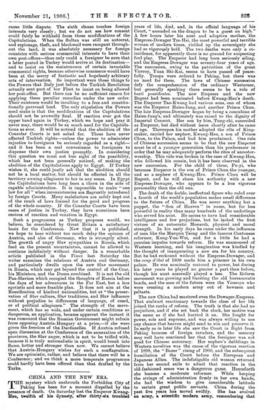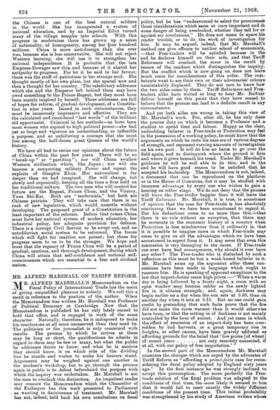CHINA AND THE NEW ERA. T " mystery which enshrouds the
Forbidden City of Peking has been for a moment dispelled by the presence of death. On Saturday last the Emperor Kwang- Hsu, twelfth of his dynasty, after .thirty-siz troubled years of life, died, and, in the official language of his Court, "ascended on the dragon to be a guest on high." A few hours later his aunt and adoptive mother, the Empress-Dowager Tze-Hsi, the most powerful and terrible woman of modern times, yielded up the sovereignty she had so vigorously held. The two deaths were only a co- incidence, for apparently there is no ground for suspecting foul play. The Emperor had long been seriously ailing, and the Empress-Dowager was seventy-four years of age. The succession, owing to the patriotism of the great Viceroy, Yuan Shi-Kai, seems to have passed off peace- fully. Troops were ordered to Peking, but there was no need for them. The laws of Chinese succession defy the comprehension of the ordinary Westerner, but generally speaking there seems to be a rule of beati possidentes. The new Empress and the new Regent had been nominated before Kwang-Hsu's death. The Emperor Tao-Kwang had various sons, one of whom was the Emperor Hsieu-fung, and another Prince Chun. The late Empress-Dowager began by being a concubine of Hsien-fung's, and ultimately was raised to the dignity of Imperial Consort. Her son by him, Tung-chi, succeeded as Emperor, but died without issue shortly after he came of age. Thereupon his mother adopted the role of King- maker, carried her nephew. Kwang-Hsu, a son of Prince Chun, to the Palace, and had him proclaimed. One rule of Chinese succession seems to be that the new Emperor must be of a younger generation than his predecessor in order that he may adequately perform the rites of ancestor- worship. This rule was broken in the case of Kwang-Hsu, who followed his cousin, but it has been observed in the new succession. For the child of three, Pu-yi, who becomes Emperor is the son of Prince Chun the younger, and so a nephew of Kwang-Hsu. Prince Chun will be Regent, and he will share his authority with a new Empress-Dowager, who appears to be a less vigorous personality than the old one.
The death of the feeble, ineffectual figure who ruled over a fourth of the world's population makes small difference to the future of China. He was never anything but a puppet, the "Son of Heaven" in name, but far less powerful in reality than many hundreds of the underlings who served his aunt. He seems to have had considerable intelligence and few prejudices, but he lacked the first virtues of an autocratic Monarch, physical and moral strength. In his early days he came under the influence of men like the Marquis Tseng and the famous Cantonese reformer, Kang-Yun-Wei, and for a little he had a genuine impulse towards reform. He was enamoured of Western learning, and his imagination was kindled by the thought of inaugurating a new era for his country. But he had reckoned without the Empress-Dowager, and the coup d'etat of 1898 made him a prisoner in his own palace. He was nominally restored to power, but during his later years he played no greater a part than before, though his aunt assuredly played a less. The Reform movement was growing and bursting the old bureaucratic bonds, and the men of the future were the Viceroys who were creating a modern army out of bowmen and peltasts.
The new China had mastered even the Dowager-Empress. That stalwart reactionary towards the close of her life joined the ranks of reform. The truth is that she had na prejudices, and if she set back the clock, her motive was the same as if she had hurried it on. She fought for power, sole and supreme, and was always willing to use any chance that heaven might send to win and preserve it. In early as in later life she saw the Court in flight front Peking because of foreign invaders, and the memory may well have convinced her that the foreigner was not good for Chinese autocracy. Her nephew's dabblings in Western novelties was the cause of the vigorous reaction of 1898, the "Boxer" rising of 1900, and the subsequent humiliation of the Court before the European and Japanese Allies. The indefatigable old woman returned from her second exile to admit that reaction in the old-fashioned sense was a dangerous game. Henceforth she became a moderate reformer. While keeping the strings of administration firmly in her own bands, she had the wisdom to give considerable latitude to certain great public servants. Chins during the past five years has moved swiftly. She has evolved an army, a scientific modern army, remembering that the Chinese is one of the best natural soldiers in the world. She has inaugurated a system of national education, and by an Imperial Edict turned many of the village temples into schools. With this progress in modernism there has grown up a sense of nationality, of homogeneity, among her tour hundred millions. China is more anti-foreign than she ever was, because she is less conservative. She will not reject Western learning, she will use it to strengthen her national independence. It is probable that the late Empress-Dowager saw this, and because of it abated her antipathy to progress. For let it be said in 'her favour, there was the stuff of patriotism in her strange soul. She thought mostly of her own place, but she spared now and then a thought for her country. The valedictory addresses which she and the Emperor left behind them may have owed something to the Prince-Regent, but they must have been mainly inspired by herself. These addresses are full of hopes for reform, of gradual development, of a Constitu- tion in nine years. Issued in such circumstances, they must be immensely impressive and effective. They are the calculated and considered "last words" of the brilliant old opportunist. Criminal in her methods—as have been most women who aspired to high political power—she had yet so large and vigorous an understanding, so inflexible a purpose, and so unfaltering a courage that she must live among the half-dozen great Queens of the world's history.
• We have all had to revise our opinions about the future of China within the past few years. There will be no " break-up " or "partition"; nor will China swallow Western civilisation whole, like Japan ; nor will she become a conquering military Power and repeat the exploits of Genghis Khan. Her nationalism is far deeper than we had imagined. She will change, but slowly and organically, keeping all the time a firm hold on her traditional culture. The two men who will control her future are the Regent, Prince Chun, and the Viceroy, Yuan Shi-Kai. Both are "modernists," but both are Chinese patriots. They will take care that there is no rush of new legislation, which would unsettle without developing. The proposed grant of a Constitution is the least important of the reforms. Before that comes China must have her national system of modern education, her ,industrial policy, her adequate provision for defence. There is a corrupt Civil Service to be swept out, and an antediluvian social system to be reformed. The forces which will fight for reaction are potent; but those for progress seem to us to be the stronger. We hope and trust that the regency of Prince Chun will be a period of gradual, cautious, and thorough development, during which China will attain that self-confidence and national self- consciousness which are essential to a free and, civilised nation.

































































 Previous page
Previous page